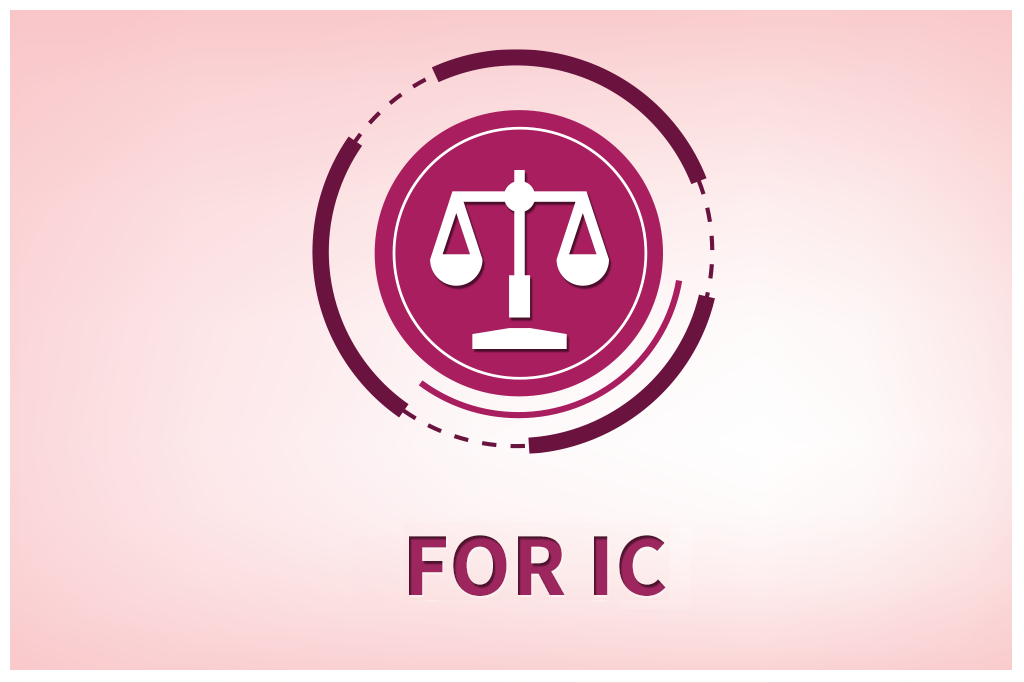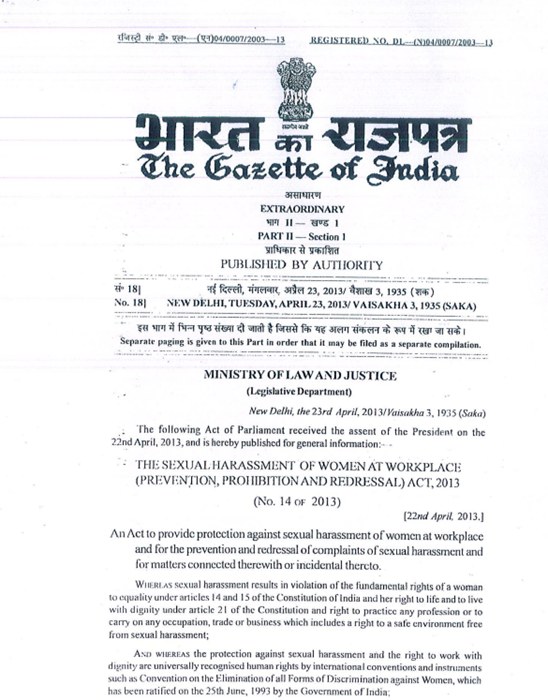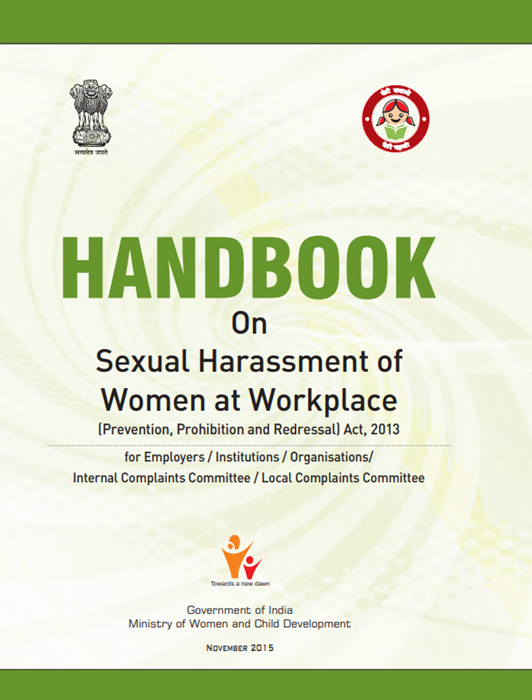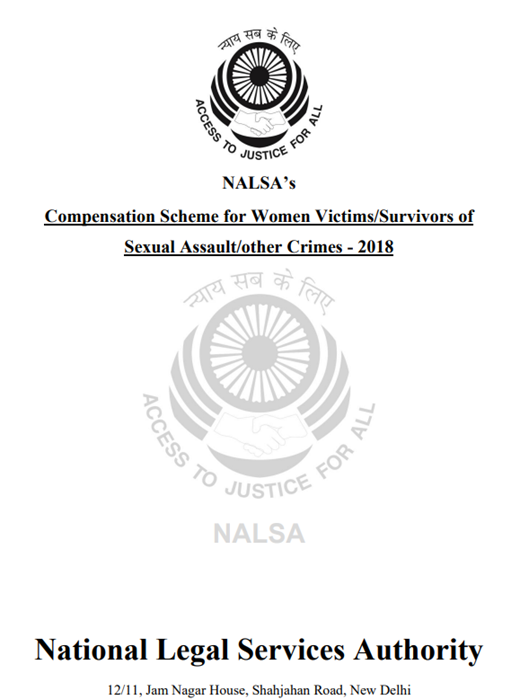About Law
About The Law
The Sexual Harassment of Women at Workplace Act 2013.
[Prevention, Prohibition and Redressal]
This Law has been enacted with the objective of providing women protection against sexual harassment at the workpalce and for the prevention and redress of complaints of sexual harassment.
The Law
It all began with the Vishaka Guidelines in 1997 and in December 2013, the subsequent legislation i.e. The Sexual Harassment of Women at Workplace (Prevention, Prohibition and Redressal) Act, 2013 came into existence. Ever since the Act came into existence, sexual harassment at the workplace is legally a crime.
The Act has been enacted to ensure safe working spaces for women and to build enabling work environments that respect women’s right to equality of status and opportunity.
The guiding principles of this law are to ensure that any woman who walks into any organisation has a forum to seek redressal when faced with an issue of sexual harassment.
Similarly, every person running an organization (i.e., any person responsible for the management, supervision, and control of the workplace and management), irrespective of the sector of operations, number of persons employed and the nature of business, must comply with the POSH laws.
Employers are responsible for establishing a policy that:
- Prohibits unwelcome behavior that constitutes workplace sexual harassment
- Champions prevention of workplace sexual harassment through orientation, awareness and sensitization sessions
- Provides a detailed framework for redress of complaints
In many ways, the enactment of this much needed act is just the beginning of the journey towards making the workplace safe and secure for women. There is still a lot that needs to be done in terms of spreading awareness about this important legislation, be it among organizations, employees or members of society.
Click here Download the Act
Click here Download the Rules
Click here Download the handbook on POSH for Women
for Employee
What is Sexual harassment?
Any person making unwelcome physical contact and explicit sexual overtures, demanding or requesting sexual favours, making sexually coloured remarks or showing pornography against the will of a woman shall be guilty of the offence of Sexual Harassment.
Sexual harassment at the workplace has been a common occurrence. Many victims tend to ignore it or play it down, often telling themselves that it was a one-off incident, and will not recur. It is often found that many victims would neither confront the perpetrator nor bring this offence to the attention of any other person in the organization, thereby adding to the ever increasing number of cases that never get reported.
The reasons why women are pressurized into not confronting this issue are varied. Whilst for some it may be due to a sense of shame or the fear of losing one’s livelihood, for others, it could be the lack of knowledge of the laws and trust in the system. Whatever the reason, this silence of women is encouraging the perpetrators and sexual harassment in the workplace is on the increase.
Ignorance can no longer be treated as bliss!
Connect with the team at POSH for Women to know how we can help
For Employer
Organizations today are much more dynamic and diverse when it comes to the constitution of their work force. However, along with this diversity comes the responsibility and accountability that employers owe to their employees.
Sexual harassment at the workplace is a glaring issue that is on the rise in corporate India. Companies can no longer afford to ignore this core responsibility of providing a safe and secure environment conductive for the growth of their employees as it not only costs them in terms of lower productivity, they also risk losing valuable assets i.e. their employees and is one of the reason for low employee morale.
Tolerating sexual harassment in the work force is no longer an option, it is mandatory for organizations to have zero tolerance for this criminal offence. The Sexual Harassment of Women at Workplace (Prevention, Prohibition and Redressal) Act, 2013, has clearly laid down the mandate for employers, which if not adhered to will attract penal action.
Under the law the employer is obliged to create a workplace free of sexual harassment. It is the responsibility of the Employer in general to:
- Create and communicate a detailed policy.
- Ensure awareness and orientation on the issue.
- Constitute Complaints Committee/sin every workplace and district so that every working woman is provided with a mechanism for redress of her complaint(s).
- Ensure Complaints Committees are trained in both skill and capacity.
- Prepare an annual report and report to the respective state government.
- District Officer will also appoint a nodal officer to receive complaints at the local level.
Whilst, many leading organizations have implemented the mandate and are pro-actively taking necessary steps to minimize the occurrence of sexual harassment at the workplace, a large number of organizations are not aware of where to being and how to go about the whole process.
Looking for guidance on how to implement the rules in your organization?
Connect with us and let us help you make your workplace secure and safe.
IC
The Act provides for two kinds of complaints mechanisms:
- Internal Complaints Committee (IC)
- Local Complaints Committee(LC)
Internal Complaints Committee (IC)
Every employer is obliged to constitute an IC through a written order. Further, the law requires that where an organization has 10 or more employees, it must form an internal complaints committee that will receive and redress complaints on sexual harassment at the work place. It is also mandatory that at least half of the total Members of the Internal Complaints Committee should be women.
MEMBER
ELIGIBILITY
CHARIPERSON
Women working at senior level as employee; if not available then nominated from other office / units / department workplace of the same employer
2 MEMBER (MINIMUM)
From amongst employees committed to the cause of women / having legal knowledge / experience in social work
EXTERNAL MEMBER
From outside the organization and who is committed to the cause of women or familiar with the issue of Sexual Harassment
Where the office or administrative units of a work place are located in different places, division or sub-division, an IC has to be set up at every administrative unit and office.







